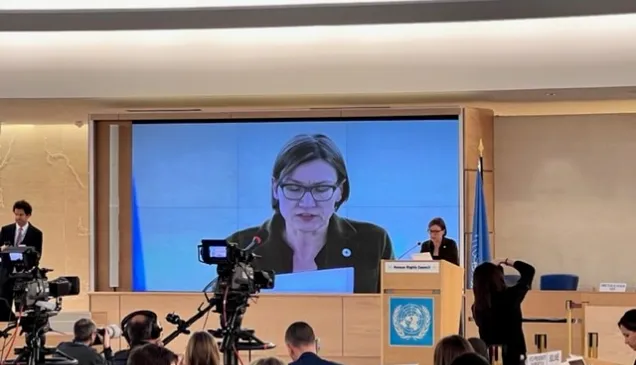Speech given by Ms Christine Beerli, Vice-President of the International Committee of the Red Cross at the Fourth Moscow Conference on International Security on 16 April 2015 in Moscow,.
Army General Shoygu,
Minister Lavrov,
Army General Gerasimov,
Dear colleagues,
Let me first of all congratulate you on this fourth Moscow Conference on International Security, a topic of continued pressing importance.
I would like to take this opportunity to speak about the interplay between what is commonly referred to as terrorism, and international humanitarian law (IHL), and the consequences for humanitarian actors like the International Committee of the Red Cross (ICRC).
Wherever we turn these days, across the world, we are confronted with increased risks of terrorist acts. Terrorism is a global phenomenon often closely linked to armed conflict; and one the international community is incrementally confronted with.
Compared to previous centuries or even decades, the armed conflicts of our times are multi-layered in nature. Interests including territorial and resource control, religious, ethnic or identity expansion, financial gain or criminal objectives are intertwined and interlinked. It is a symptom of our times that actors, just as the conflicts they partake in, are multi-layered, too.
The rise of organized non-State armed groups – the Islamic State Group being the most visible one at the moment – and the simultaneous increase in attacks by such groups or their affiliates, have led to a worrying global discourse. Worrying because the status of party to an armed conflict is frequently denied to these groups, presented as 'terrorists' only. The simplistic conclusion is that any act of violence carried out by such groups is purely terrorist in nature, and therefore always unlawful. An important far-reaching consequence is that the applicability of international humanitarian law with its explicit provisions is often denied while an objective assessment of facts on the ground prove that the group should be considered as a party to the conflict.
From a legal perspective, IHL distinguishes clearly between lawful and unlawful acts committed within armed conflicts. Legally, there is no doubt that IHL applies, fully, to acts of terrorism committed during wartime. The ICRC strongly condemns all these acts of violence which reject the very notion of humanity in war such as direct attacks against civilians or civilian objects, indiscriminate attacks or attacks spreading terror among the civilian population. Those acts are clearly prohibited by IHL and may amount to war crimes.
In the context of armed conflict however, IHL does not prohibit attacks against combatants or military objectives, as long as these follow the principles of distinction, proportionality and precaution. International humanitarian law also gives States a margin of manoeuvre in order to deal with actions undertaken by organized non-state armed groups in situations of non-international armed conflict. In such contexts, there is no doubt about the right of States to prosecute the acts of any non-State armed groups under their national legislation, acts since those groups enjoy neither the privileges nor the immunity accorded to combatants.
Regarding the categorization of actors as either non-State armed groups or terrorists, this choice can have severe implications for how States and the international community respond to and deal with them. Some States may think that the voluntary assignment of one or another category to individuals or groups defines which legal framework applies to them. This is incorrect. The ICRC maintains that designating individuals or groups as terrorists can in no way deprive them of their protection under IHL
This mutual exclusivity – based in discourse, rather than law - can also threaten the core actions of the International Committee of the Red Cross (ICRC) and other humanitarian actors.
Today, 14 years after a 'war on terror' was first declared, we find ourselves in a situation where the interplay between conflict and terrorism, between international and domestic law culminates in an ever expanding grey area.
I would like to use the opportunity of addressing you here today to urge you not to give in to the grey zone of definitions, but to follow both the letter and the spirit of the law, and to challenge the entire international community to do so. International humanitarian law is the most complete and adequate code at our disposal to ensure the protection of civilians and persons hors de combat in armed conflict.
Yet tighter and new counterterrorism measures and legislation – by States as well as the United Nations – can make humanitarian work even more difficult.
At the International Committee of the Red Cross, we base our actions on the needs of people affected by armed conflict and other situations of violence because we are convinced that neutral, independent and impartial humanitarian action has the best chance of reaching those most in need. It is also a tried and tested formula to prevent humanitarian action becoming part of larger and more controversial political agendas.
Yet our neutrality, independence and impartiality is immediately jeopardized if engaging with non-State armed groups becomes more difficult due to counter-terrorism measures. The ICRC does not take positions on the legitimacy of States taking counter-terrorism measures. But such measures must not criminalize our own humanitarian engagement, including with organized non-State armed groups designated as "terrorists". Humanitarian engagement with non-state organized armed groups is a task foreseen set out under Common Article 3 of the Geneva Conventions, and which the ICRC is expected to perform. This allows the ICRC to offer its services to all parties to non-international armed conflict.
Criminalizing humanitarian action in any sense not only runs counter to the letter and spirit of IHL, it also prevents us from protecting and assisting the populations who have fallen victim to armed conflict, in particular in areas controlled by non-state organized armed groups.
I would like to conclude by calling on all of you present here today to examine your States' and international fora's positions on terrorist acts closely – be it contact with individuals and groups considered terrorists, or assistance to them – and to evaluate whether or not they allow for and strengthen the humanitarian space necessary for our, and other impartial humanitarian organizations' work.
Thank you.
This web version of Ms Beerli's speech corresponds to that deliverd at the conference, with minor linguistic corrections.



